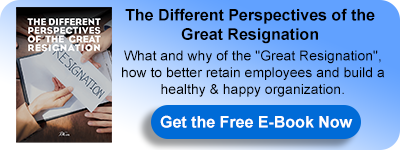Hanging on to Employees During the Great Resignation: How Some Employers Made it!
1. Trust
During the coronavirus pandemic, remote-work choices, flexible hours, and autonomy were not only a public health imperative or a kindness. They indicate that businesses have faith in their employees' ability to balance personal and professional obligations.
Steve Ross, the CEO of a marketing agency in Joliet, Illinois, has a policy of paying employees their hourly wage for a 40-hour week even if a project takes them less than 40 hours to complete and does not require them to clock in or out for the day. "I tell everyone that the results of their job are more important to me than the time they spend doing it." They're here to deliver results, not to waste time. I don't think I should have to or want to control their minutes because they're all adults."
2. Non-Monetary Appreciation
While many workers were grateful just to have a job during the epidemic, several employers went out of their way to express gratitude for their efforts.
Karrie Duke, director of development at a Kansas City, Mo., nonprofit, highlighted that they invested every cent into their employees. She added that she feels this strategy prevented them from losing many employees during such hard pandemic times.
Duke added that her company's management also goes out of its way to recognize and acknowledge its employees in non-monetary ways. "Gifts, lunch, and social media recognition should help them feel seen and valued."
3. Support
In contrast to businesses that ignored coronavirus protection practices and enabled clients to do the same, some employers are ensuring employees know they have their backs. "We now terminate clients who are unpleasant," Cindy Yepez said at the Houston veterinary clinic where she works.
The owners decided that things are stressful enough with covid that they just aren't going to put up with disrespectful or abusive people to staff.
The New Workforce Vs Gig Economy
While many businesses stalled during this exceptional period, the gig economy flourished enormously, owing to a massive demand for services and a growing pool of newly available employees who needed to earn money.
Human resource practices will be required to attract and manage people in today's digital firms. Hyper-personalization of HR services will no longer be a pipe dream for future businesses; it will become a need. Organizations will have to adapt benefits more than ever before based on an employee's living conditions. This is especially true in the aftermath of the pandemic when employees learned the benefits of workplace flexibility. The gig economy will likely flourish in such an environment as more digital platforms step up to the plate to address service gaps. Customers and internal personnel will benefit from technology in this circumstance. To recruit and retain talent, we will need to develop hybrid work models that combine the traditional workforce with the gig economy.
New AI and cognitive technologies will make it easier to create employee experiences as every organization becomes digital. It will also be necessary for businesses to target their unique employee experiences. Companies that prosper will keep their employees, provide an empowering work environment, and promote career growth. 2
Although it's been a year and a half since the pandemic, however, the world is still continuing to shift, causing new changes in the way we live and work. Thus, shifting our mindsets as the world revolves has become a necessity. The faster we adapt and change the way we think and operate, the more significant the benefits and impact on our business, ourselves, and our employees. It's such a tough time, yet, it's survival of the most adaptable.
1The Washington Post, 4 Nov 2021, karla L. Miller, How these employees held onto workers during the great resignation, Accessed 20 Dec 2021, https://www.washingtonpost.com/business/2021/11/04/employers-keeping-workers-great-resignation/
2 Forbes, 13 May 2021, Srikanth Karra, The Gig or Permenant Worker: Who Will dominate the Post Pandemic Workforce, Accessed 20 Dec 2021, https://www.forbes.com/sites/forbeshumanresourcescouncil/2021/05/13/the-gig-or-permanent-worker-who-will-dominate-the-post-pandemic-workforce/?sh=775eed863cdc
Forbes, 10 Sep 2021, Ania Smith, Covid19 and the Gig Economy: What to Anticipate when the World returns to Normal, Accessed 20 Dec 2021, https://www.forbes.com/sites/forbesbusinesscouncil/2021/09/10/covid-19-and-the-gig-economy-what-to-anticipate-when-the-world-returns-to-normal/?sh=74edf9f4dd87
For more about this topic, download our latest book " The Different Perspectives of the Great Resignation " for FREE:
